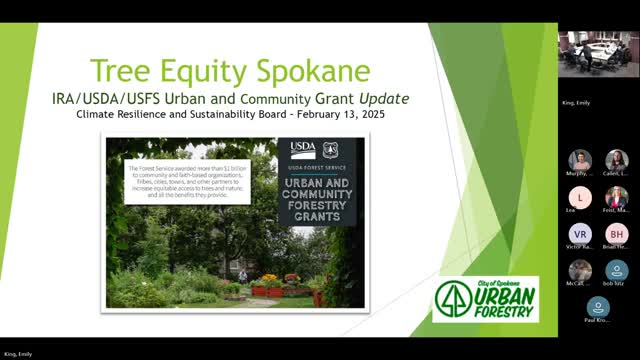City outlines $6 million tree‑equity project; crews paused pending federal grant administrator guidance
Get AI-powered insights, summaries, and transcripts
Subscribe
Summary
City urban‑forestry staff told the board they have begun removing dead street trees and planting in low‑canopy neighborhoods under a multi‑year federal grant, but said contractors are on hold while grant administrators review spending guidance.
Katie Husseyke, an urban forester with Parks and Recreation, briefed the board on “TX‑Ready Spokane,” a multi‑year tree‑equity project funded with federal grant awards and local sub‑awards. The grant work packages include removing hazardous dead street trees, pruning to extend the life of existing street trees, and planting new trees in neighborhoods with the lowest canopy cover.
Scope and partners: Husseyke said the city applied for a larger award and is implementing a $6 million award that targets disadvantaged and low‑canopy areas inside the program boundary (most of the city except the upper South Hill and large parts of northwest Spokane). The Spokane Conservation District is a key partner and is supplying trees from its own $6 million award; the Lands Council will handle expanded education and outreach and help secure homeowner commitments for planting and care. Husseyke said contractors have been engaged with locked unit pricing and that the team had planted 77 street trees in the fall and removed roughly 100 of the nearly 400 right‑of‑way dead trees so far.
Maintenance, equity and homeowner responsibilities: Staff said they will offer replacements and education and seek homeowner commitments to water new trees during hot summer months. Husseyke warned that “trees will not last our hot summer months if they don’t receive water,” and described low‑cost establishment approaches (mulch rings, turf removal, branded watering buckets) rather than higher‑maintenance irrigation systems. Board members raised questions about tenant/landlord responsibilities for trees on rental properties and the city said staff will ask applicants and tenants to involve property owners so the abutting owner understands long‑term obligations.
Grant pause and financial status: Staff said the US Forest Service (grant administrator) has asked the city to pause new expenditures pending clarification of federal guidance; Parks staff said they were pursuing agency clarification and that about $250,000 in invoices remain pending reimbursement under the grant. Staff and board members discussed legal and congressional channels to seek clarification and asked municipal managers to track reimbursements and contractor commitments to limit fiscal impacts.
Implementation and policy discussion: The urban‑forestry team said the project pays immediate safety dividends (removing hazardous dead trees), builds canopy in disadvantaged neighborhoods (East Central, Logan and others), and supports longer‑term resilience. Staff noted prior local conversations about steady funding for street‑tree maintenance (a 2011 stormwater fee proposal had previously failed by one council vote) and suggested that the city consider ongoing funding sources rather than relying solely on periodic large grants.
Ending: Husseyke and contractor partners said they will continue outreach and neighborhood mailings; the board offered to help identify community connections and suggested the team provide the board with inventories and status updates while the grant‑administrator question is resolved.
